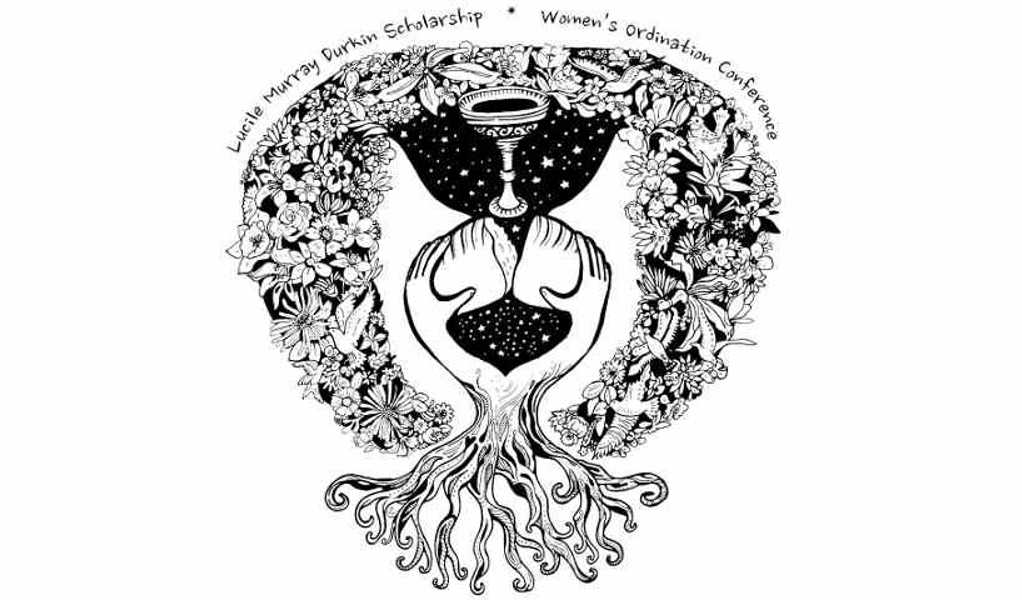
Logo for the Lucile Murray Durkin Scholarship Fund for Women Discerning Priestly Ordination
"There is always a moment in childhood when the door opens and lets the future in," Graham Greene writes in his novel The Power and the Glory.
For Sheila Durkin Dierks, that moment came around the age of 5 or 6 when she was playing priest.
"I can still see the light and feel the air in the room," Durkin Dierks said in a recent interview with Women's Ordination Conference. "And I said to my mother that I intended to be a priest when I grew up."
Her mother, Lucile, quickly shut down the idea, reminding her daughter that only boys could be ordained to the priesthood.
Like a character in a Greene novel, Durkin Dierks would have the grace of that first calling following her throughout her life. "That moment has never left me, but neither did the absolute feeling that I would be ordained," she recalled. Years later, when she discovered the Greene quote, she tacked it to her bulletin board.
Over time, that same grace seemed to work on her mother, too. After Lucile's death in 1999, Durkin Dierks discovered a letter her mother had written in 1977 to a Cincinnati Catholic newspaper: "When, in the future, women are serving God and His people in the fullness of priesthood. … [these] brave pioneers and their sisters will be blessed for their courage and perseverance," Lucile proclaimed in a letter to the editor.
"My mother was a strong advocate for women in the context of her time, always leading organizations in the parish and diocese and in the community, trying to take the ministry of women to the next level," Durkin Dierks says. Nevertheless, her mother's prophetic vision stunned her.
Durkin Dierks' sense that she would be a priest became a reality when she and her husband, Peter, joined the Light of Christ Ecumenical Catholic Community in Boulder Colorado. In 2009, the community sponsored her for ordination into the Ecumenical Catholic Communion. Today, she still serves that parish and is also the primary pastor of Community in Discernment, also in Boulder.
One year ago, as a way to honor both her mother's vision as well as her own calling to the priesthood, Durkin Dierks endowed the Lucile Murray Durkin Scholarship Fund for Women Discerning Priestly Ordination. The fund, which is operated through the Women's Ordination Conference, offers small grants to women who are enrolled or accepted into an undergraduate or graduate studies program, and is primarily directly to women who wish to be ordained Catholic priests, including Ecumenical Catholic Communion priests or Roman Catholic Womenpriests.
Though Durkin Dierks acknowledges that the scholarship will not offer large sums of money, its greater purpose is to acknowledge that Catholic women are called to the priesthood. "It can serve as an encouragement to those who may not have the means to pursue and fulfill their inner vocational voices," she says. "It will signal for young women their right to answer their calls and become well educated to do so."
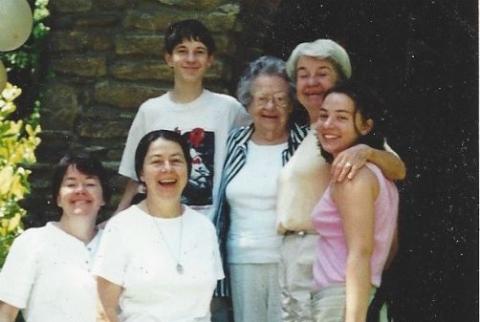
Lucile Murray Durkin with her daughters, Ellen (Mary-Cabrini) Durkin, Frances Durkin Colletti, Sheila Durkin Dierks and two of her seven grandchildren, John Dierks and Alice Colletti (Courtesy of Sheila Durkin Dierks)
This past July, Women's Ordination Conference announced the first three recipients of the scholarship. Two of the women, Elaina Jo Polovick and Lisa Cathelyn, are currently pursuing Master of Divinity degrees at the Jesuit School of Theology at Santa Clara in Berkeley, California. The third recipient, Sarah Holst, is a Master of Divinity student at United Theological Seminary of the Twin Cities in Minnesota. Each woman received a renewable gift of $1,000.
For these women, even a little bit of hope and encouragement can go a long way. Though each has a different vision of how she might minister, they are all aware that they are seeking to serve an institutional church that does not view their callings as valid. Unlike for Catholic men who are discerning the priesthood, church leaders will not rejoice in, pray for, or support their vocations. Unlike their male seminarian classmates, they will face significant financial hardship as they pursue their vocations. Each of them is accruing steep loan debt, and none of them expect to find well-paying jobs in ministry — if they find jobs in their vocation at all.
The possibility of employment in a Catholic setting seems especially unlikely for Sarah Holst, since she is seeking ordination with the Roman Catholic Womenpriests movement. According to a 2007 decree from the Congregation for the Doctrine of the Faith, Holst will face automatic excommunication for receiving sacred orders from Roman Catholic Womenpriests.
A native of a small town in Nebraska, Holst felt called from a young age to a life of community, prayer and service. "I assumed I would be a sister," she said in an interview with National Catholic Reporter. But a priestly vocations video that she watched as a high school senior at a Catholic Youth Organization meeting stopped her in her tracks.
"The movie was called 'Fishers of Men,' " she recalls. "And even though it was super cheesy, after I watched it, I got into the car and just burst into tears."
While she was an undergraduate student at St. Ambrose University in Davenport, Iowa, Holst went through the formation process for a women's religious community. But a calling to the priesthood and to marriage led her to abandon that plan.
She served two years in the Jesuit Volunteer Corps, worked one year with the Episcopal Service Corps and spent countless formational hours with Catholic Worker communities. Along the way she also met Nathan, who shared her passion for racial justice, community organizing and trauma work. They married in 2015 and since then have moved around the country living among communities that they find inspiring.
Holst attends a Protestant seminary and realizes that her path could be much easier if she joined a different Christian denomination than Catholicism. But the beauty and hope that she finds in the sacraments keep her tied to the Catholic tradition. "The call to priesthood is a call to be a healer," she says. "The sacraments are central to my vision of healing, organizing and doing justice work."
Her goal for her ministry is to have her feet "in the seminary, the sanctuary, the streets and the soil," she says, but she often worries how she will "weave all of this together and still have food to eat."
As she moves through her preparation for priesthood, she envisions serving Catholics in Duluth, who often struggle to find a progressive faith community. But she also envisions serving other communities in non-traditional ways. "I'd like to do a traditional Mass in the morning and then in the afternoon offer a garden church. It would serve a smaller community of people who are survivors of different kinds of trauma."
The opportunity to create new forms of church, she says, helps her heal from her own anger at the injustices in the institutional Catholic Church. "I can't let the anger derail me," Holst says, "so instead I try to discover new, constructive ways to bring the sacraments to people."
"The scholarship can serve as an encouragement to those who may not have the means to pursue and fulfill their inner vocational voices. It will signal for young women their right to answer their calls and become well educated to do so."
— Sheila Durkin Dierks
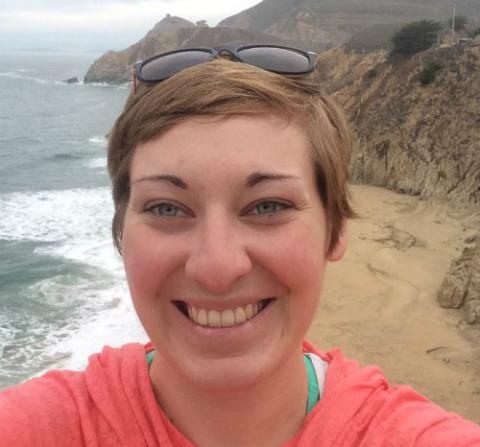
Elaina Jo Polovick, recipient of the 2017 Lucile Murray Durkin Scholarship, is a Master of Divinity student at the Jesuit School of Theology in Berkeley, California. (Courtesy of Women's Ordination Conference)
Anger is not an unfamiliar emotion for Polovick or Cathelyn as they witness the stark contrasts between their struggles to earn a Master of Divinity degree and the privileges enjoyed by their male, Jesuit classmates who have their tuition, housing and food fully covered by the Society of Jesus. A three-year M.Div. program at Jesuit School of Theology costs over $50,000. That doesn't include the $3,000 for medical insurance and inflated rates for rent and food in Berkeley. Though the Jesuits technically take a vow of poverty, Catholic women who have no hope of ordination often find themselves living on the poverty line.
Cathelyn, who is on Medicaid because she cannot afford the school's health insurance plan, says that most of her non-Jesuit classmates work two or three jobs to try to pay their rent and food bills. She lives in a community with six other students, but the rent still runs at $750 per person per month. "Unfortunately the best schools in theology are located in cities that are very expensive to live in," she says. "All I can do is hope and pray for job security after I graduate."
Advertisement
Cathelyn's interest in theology and ministry was first sparked while she was an undergraduate student at Marquette University, where she minored in theology and became acquainted with Ignatian spirituality. After graduation, she worked a service year with the Sisters of St. Joseph in Minneapolis, offering direct services to clients at a health care clinic. On weekends she would attend the local parish, St. Joan of Arc. "It was so vibrant," she recalls. "The pews were filled. That's when I decided I wanted to be a part of this."
Cathelyn says there was no "aha moment" that called her to ordination. She grew into her calling by co-leading liturgies, doing ministry in a women's prison in Dublin, California, and preaching — which she was allowed to study not at the Jesuit School of Theology, but at the neighboring Episcopal seminary, the Church Divinity School of the Pacific. "I have felt unwelcome or disused by the institutional church," Cathelyn reflects, "but I hear the people that I am serving saying 'we want you, we need you,' and I need them, too."
Even amid the hurt, Cathelyn says that she cannot imagine not being Catholic. "I feel like it's in my blood," she says. She hopes to try to stay within the church and change the system from within. "If the church is a boat, I'd rather be inside rocking the boat than outside of it making waves."
Her deepest hope is that the Pope Francis' recently appointed Study Commission on the Women's Diaconate might open up an opportunity to become a deacon. "But regardless of where I end up," she says, "I want to walk with the people of God."
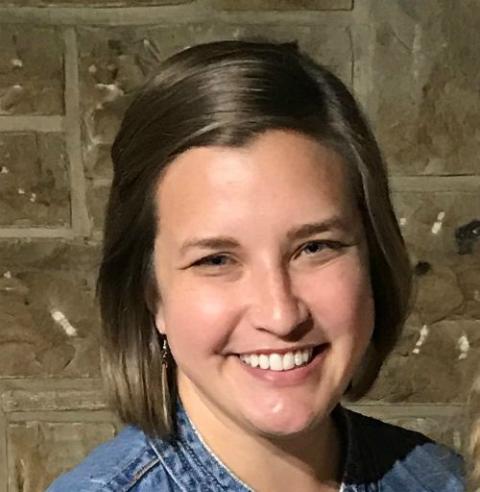
Lisa Cathelyn, recipient of the 2017 Lucile Murray Durkin Scholarship, is a Master of Divinity student at the Jesuit School of Theology in Berkeley, California. (Courtesy of Women's Ordination Conference)
It was at an ordination of male deacons that Catheyn's classmate, Elaina Jo Polovick, first heard her own call to ordained ministry. A native of South Bend, Indiana, Polovick was 12 years old when she and her family got invited to the ordination at the Basilica of the Sacred Heart. "The moment I watched them lie prostrate on the floor of the sanctuary I had this overwhelming feeling that I wanted to be among them," she recalls.
Polovick pursued her undergraduate degree at Loyola University Chicago, where she befriended a young Jesuit student who encouraged her vocation to the priesthood. "He told me he believed I could be a priest," she recalls.
After graduation, she joined the Jesuit Volunteer Corps and was placed on a reservation in Montana. "The town had 500 people and a priest was not available every Sunday, so lay and religious women preached and led Communion services," Polovick says.
Her ministry on the reservation and a later placement at the Newman Center at the University of Michigan, where she also preached and helped lead retreats, convinced her to pursue her Master of Divinity degree at the Jesuit School of Theology. "I wanted to impact and be impacted by clergymen," she says. "I didn't want to be siloed off from priests."
Polovick has found creative ways to gain access to courses at Jesuit School of Theology that are reserved only for seminarians. "I volunteer as an actor for a course called 'Celebration Styles,' where my Jesuit classmates learn to celebrate the sacraments," she says. "I have played the mother of a deceased child, a dying hospice patient and a catechumen."
But once she is done playing her part, she is told the leave the classroom, often in the middle of the day's lesson. "In the time I'm in the classroom I try to soak up the knowledge that the seminarians are receiving about the sacramental tradition."
To make ends meet, Polovick works 25 hours a week at two jobs. In addition to her coursework, she also performs 10 hours a week of field education work. "It has pushed me beyond what I can physically do."
But Polovick refuses to allow the financial burdens or the fear of excommunication or unemployment deter her from living out her authentic calling. "I have let go of making it about me," she says. "I had to find freedom from fear. I'm not afraid that the ordination of women won't happen in my lifetime, but I am afraid that if I don't fight it won't happen at all."
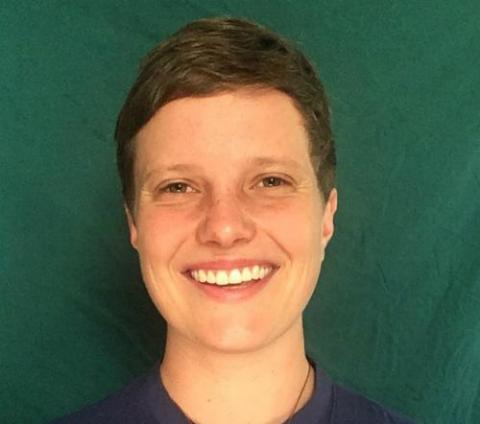
Sarah Holst, recipient of the 2017 Lucile Murray Durkin Scholarship, is a Master of Divinity student at the United Theological Seminary of the Twin Cities. (Courtesy of Women's Ordination Conference)
The sentiments of these women sound strikingly familiar to feminist theologian Mary Hunt, who served on the committee that chose the recipients for the 2017 Lucile Murray Durkin scholarship. "I read with tears in my eyes several of the applications," Hunt reflects. "I recognized myself and other Catholic women I know and love in the stories these women told."
Hunt says that she was moved by the applicants' honesty, clarity and sense that they were in unfair situations. "But I also felt rage at the fact that, 40 years after my own studies, these women are still plagued by the same issues that I confronted."
After decades of work teaching graduate courses in theology and ministry in the U.S. and Latin America, Hunt says she is more persuaded than ever that Catholic women must continue to make their way. "We are more than capable of being ministers, and the larger world needs us," she says.
That these women would undergo debt, marginalization and underemployment to live out their vocations is a sign that their work is holy, Hunt says. Reading the applications, she says, gave her the opportunity "to be reminded of the valor and integrity of our sisters."
Their diligence and courage, Hunt says, gives her hope that, even amid all of the hardships and challenges, "We will prevail!"
True to Graham Green's quote, these young women, and countless women like them, had a moment in their early years where, they believe, God opened a door and called them to a future in ministry. The question remains whether the Catholic Church will fully open its doors to these women and allow them to lead the church into the future.
[Jamie L. Manson is NCR books editor. She received her Master of Divinity degree from Yale Divinity School, where she studied Catholic theology and sexual ethics. Her email address is jmanson@ncronline.org.]
Editor's note: We can send you an email alert every time Jamie Manson's column, "Grace on the Margins," is posted to NCRonline.org. Go to this page and follow directions: Email alert sign-up.








